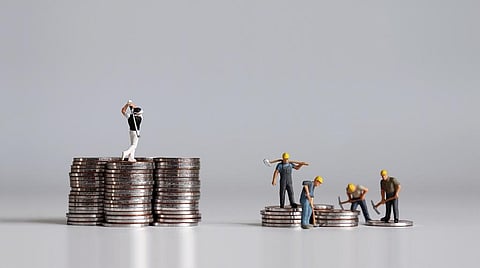

A tax of up to 5 per cent on the world’s multi-millionaires and billionaires can raise $1.7 trillion annually. This can lift two billion people out of poverty, according to a new report by Oxfam, a global network of people, working together to end the injustice of poverty.
The report, released on the first day (January 16, 2023) of the annual World Economic Forum meeting in Davos, Switzerland noted that the divide between the richest and the rest of the world had broadened over the past two years.
This was because wealth continued to be concentrated in a few pockets. The wealth of the richest one per cent has increased by almost double that of the rest of the world’s population, noted the Oxfam report.
“Taxing the super-rich and big corporations is the door out of today’s overlapping crises. It’s time we demolish the convenient myth that tax cuts for the richest result in their wealth somehow ‘trickling down’ to everyone else,” Gabriela Bucher, executive director of Oxfam International, said in a statement by Oxfam.
The assets of the super-rich increased by $26 trillion, while the bottom 99 per cent only witnessed a $16 trillion increase in their wealth. Nearly two-thirds of the $42 trillion in new wealth produced since 2020 was grabbed by the super-rich, said the document titled Survival of the Richest.
The net worth of billionaires is growing by $2.7 billion each day, while at least 1.7 billion people currently survive in countries where inflation surpasses earnings.
“While ordinary people are making daily sacrifices on essentials like food, the super-rich have outdone even their wildest dreams. Just two years in, this decade is shaping up to be the best yet for billionaires,” said Bucher.
Poverty reduction likely came to a grinding halt post-pandemic after the number of poor surged in 2020.
“Decades of tax cuts for the richest and corporations have fueled inequality, with the poorest people in many countries paying higher tax rates than billionaires,” an Oxfam press release read.
Approximately one in ten people on Earth — more than 820 million people — are going to bed hungry.
“Women and girls often eat least and last and makeup nearly 60 per cent of the world’s hungry population. The World Bank says we are likely seeing the biggest increase in global inequality and poverty since WW 2 (World War),” the statement added.
The year 2022 saw a rise in billionaire wealth due to soaring food and energy prices. Some 95 food and energy corporations more than doubled their profits in 2022. They gained $306 billion in windfall profits, of which $257 billion (or 84 per cent) was distributed to wealthy stockholders.
The document cited examples of the Walton dynasty, which holds half of Walmart’s shares, getting $8.5 billion.
The fortune of Indian billionaire Gautam Adani, owner of prominent energy companies, increased by $42 billion (46 per cent) in 2022 alone, it noted.
Taxing the super-rich is the strategic precondition to reducing inequality and resuscitating democracy, Bucher said.
“We need to do this for innovation. For stronger public services. For happier and healthier societies. And to tackle the climate crisis, by investing in the solutions that counter the insane emissions of the very richest,” Bucher added.